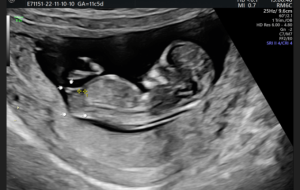Adverts
Ah, the magic of pregnancy! Since ancient times, future parents and family members have been caught up in hunches and traditions trying to guess: is it a boy or a girl?
And while traditional techniques – such as the shape of the belly or the way the baby moves – have their charm, technology has arrived to give us a little extra help in this fun guesswork.
In today's digital universe, several applications promise to shed light (or at least, a well-founded guess!) on the sex of the future family member. Come with us to find out how they work and whether technology can really solve this sweet mystery!
Where do the hunches come from?

Since people found out they can have babies, they've also started making guesses about whether it would be boy or girl. It's a tradition that has existed for centuries, and each culture has its own beliefs and methods for trying to guess.
Some people believe that if the mother's belly is more pointed, it's a boy. If it's more rounded, it's a girl. They say that if the mother carries the baby lower, it is a boy; If you press it higher, it's a girl.
Some say that craving acidic foods it means it's a girl and craving sweet foods indicates a boy. This ancient method uses the mother's age and month of conception to predict the baby's sex.
In some places, they hang a necklace or ring over the mother's belly. If it moves in circles, it's a boy; If it rocks back and forth, it's a girl. And in some cultures, they believe that if the mother is more irritable or moody, she is expecting a girl.
Always remember that these are just popular guesses and traditions. They are fun to try, but they have no scientific basis. Nowadays, ultrasounds and medical exams are the most reliable ways to find out the baby's sex.
How do modern apps work?
Many apps They ask questions about things like the mother's food desires, her mood, the shape of her belly, among others. Then, based on the answers, they make a guess, often using popular traditions as a basis.
Some applications use old methods, such as Chinese Calendar, asking for information such as the mother's age and the month in which the baby was conceived to give a prediction.
More sophisticated applications can use algorithms – which are like mathematical formulas – to analyze the information given and make an educated guess. This may combine several methods and traditions to arrive at an answer.
Some apps don't take the idea of “guessing” seriously and are more for fun. They there may be games, quizzes and other interactive activities for parents to have fun while waiting for the big day.
